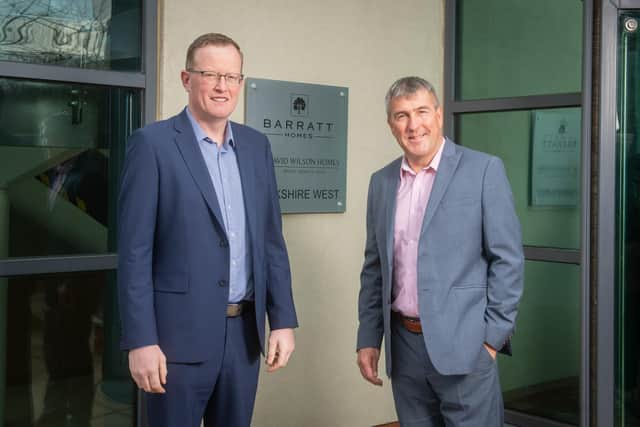Yorkshire housing planning applications taking 18 months rather than 13-week target to be determined, Barratt bosses warn
Barratt Developments Yorkshire, which includes the Barratt Homes and David Wilson Homes brands, built 1,369 new homes across the region last year – supporting more than 3,000 jobs in the process.
But Ian Ruthven, Managing Director at Barratt Developments Yorkshire West and Daniel Smith, Managing Director at Barratt Developments Yorkshire East, said building work is being held up by frequent delays in councils determining planning applications.
Advertisement
Hide AdAdvertisement
Hide AdThe process is supposed to take 13 weeks for large applications but the pair said that in some cases, it is taking longer than 18 months.


Mr Ruthven said: “The time from agreeing terms on a site and submitting a planning application before we are starting on a site, never mind moving people into their first homes, is now around 18 months. The planning process is meant to be 13 weeks.
“The biggest problem local authorities have got is planning resource, they have not got the people to do it. Then they have to consult all the different bodies - highways, local housing, landscape. Those departments don’t have the resources. Then when you get an approval you’ve then got to get your various section agreements in place."
He said local political factors can play a part in how challenging it is for an application to be approved.
Advertisement
Hide AdAdvertisement
Hide Ad“What frustrates most planning applications are those with local authorities that are more marginal in terms of their political leaning. If we have got a local authority that is heavily one side or the other, they seem to be a bit more decisive. Barnsley is predominantly Labour and getting a planning permission is much more straight-forward.”
Mr Smith said: “A big frustration is you have professional people who know planning inside out who are going through the process and making decisions on whether they are happy. They say ‘yes we are happy to recommend’. Then you have councillors who haven’t got any experience in the planning field. I know they represent their constituents but they are making decisions that go against professional advice.”
He added: “The main starting point is resource and making sure planning departments are resourced accordingly to deal with the level of applications they get.
“Housing developers are quite happy to fund some of that in exchange for committing to a timescale. The delays have a massive impact because we are in a business where you are planning to deliver housing and people’s jobs rely on you delivering that.”
Advertisement
Hide AdAdvertisement
Hide AdMr Ruthven said: “New housing has a knock-on effect of associated industries, professions and retail. It has such a big economic benefit.
“What we find is even on sites that are allocated for housing, people will object on the basic principle of housing when that has been established. Then councillors will object on the principle of housing and go against what the experts say.”
The pair said areas with established Local Plans setting out sites allocated for housing tend to perform better and cited Wakefield and East Riding as positive examples.
Mr Ruthven said: “Wakefield was one of the first in our operation area to have a Local Plan adopted. We had one of the first applications after that and the chair of the planning committee was able to very strong with a political objector who had signed up to the adopted plan but was making an objection. It helps people who have to make these decisions. People who are opposed tend to be more vocal than those for. The silent majority think we do need some homes."